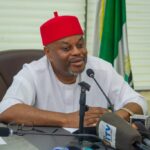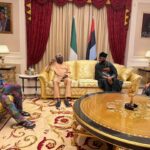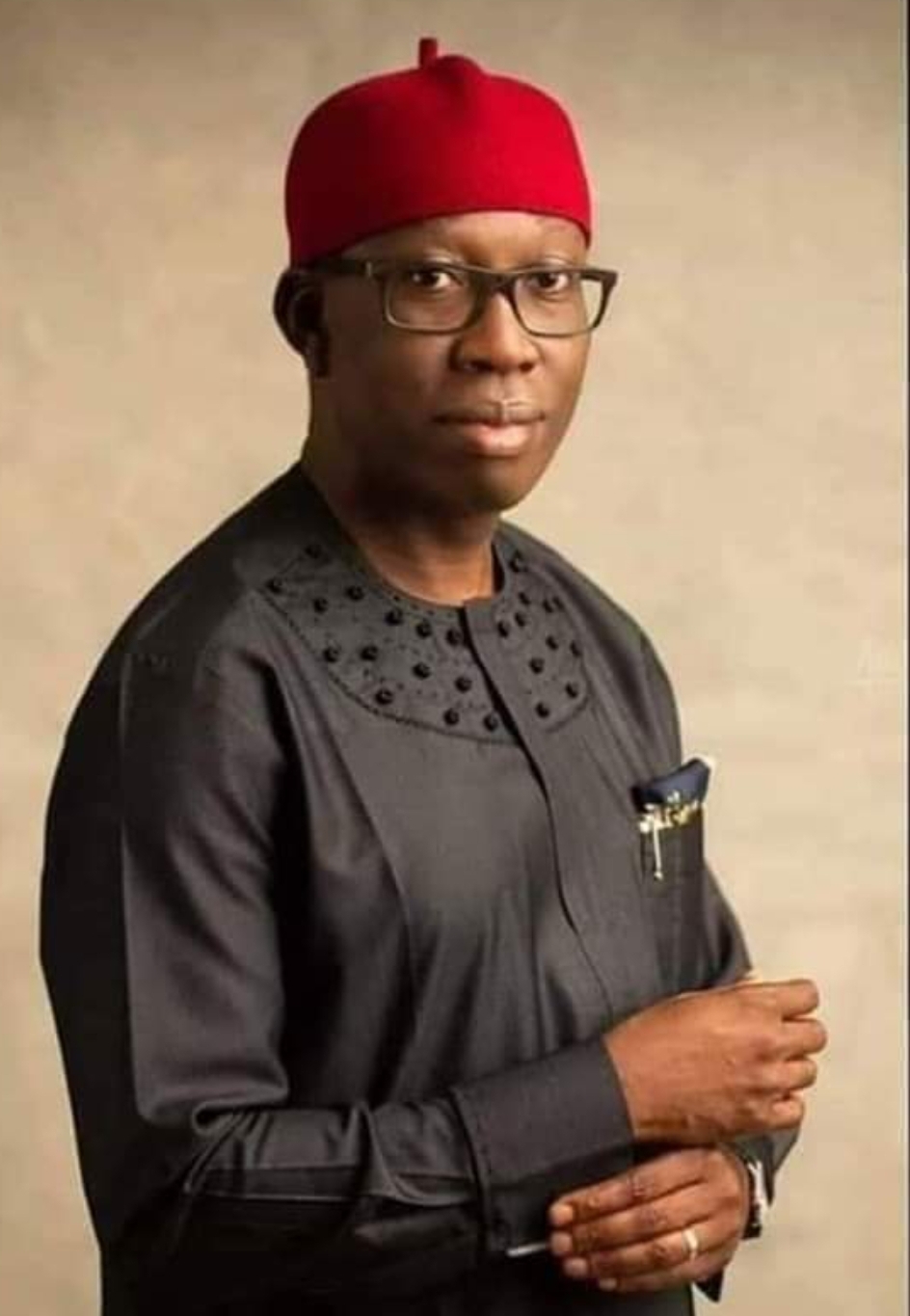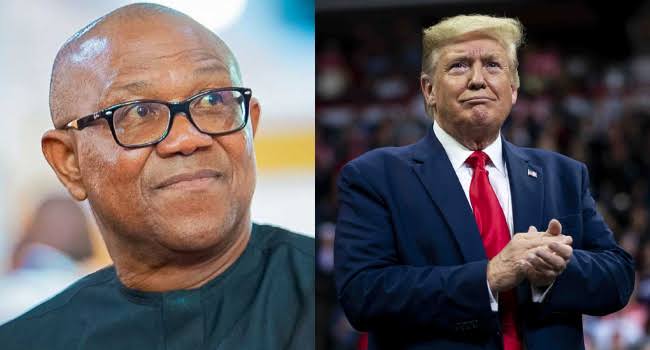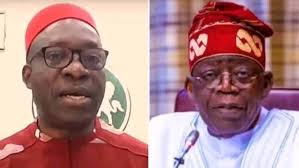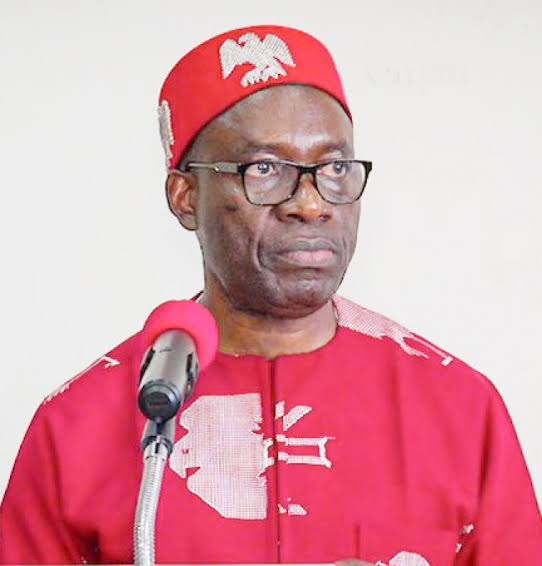By Law Mefor
‘Ifeanyi’ is a generic name borne only by the members of the Igbo ethnic stock. The name means: nothing is beyond God. Why then is one who bears the name required to prove that he belongs to the Igbo ethnic group or to prove such ancestry? This pettiness of some Igbos who go to the extent of claiming that Governor Ifeanyi Okowa is not one of them is pathetic, mischievous or borne out of outright ignorance.
Governor Ifeanyi Okowa is from Owa, one of the major Ika Igbo settlements across the Niger. The differentiation being mounted artificially between the South-east Igbo and South-South Igbo is politically inspired and self-serving. For the avoidance of doubt, Ika is a dialect of the Igbo language spoken in Ika South and Ika North East Local Government Areas of Delta State and the Igbanke area of Edo State in Nigeria. It belongs to the larger Niger Igbo cluster of dialects and therefore, one of the many Igbo dialects.
Ika is therefore not a distinct ethnic group. Ika is Igbo; those who hail from the area are Igbos by blood and have nothing to prove to anybody regarding such a blood relationship with kit and kin of the South-east. Let it also be stated that Ika Igbos are more Igbo than some groups found in many states in the South-east. Without naming them, such people have ancestries traced to far-flung Kogi state and therefore not Igbo by blood but by adoption.
Yet, nobody has ever raised questions about the Igbo claims by such adopted groups, who have continued to live, survive and progress as an integral part of the Igbo ethnic stock. It is therefore surprising that some would raise questions about the ethnic origin or ancestry of an Ika Igbo man or woman who is Igbo by consanguinity (blood). Even where the Ika man or woman claims he or she is not Igbo, it still does not detract from that person’s bloodline.
Ika Igbos are not alone in bearing this dilemma. Ikwere people of Rivers state is yet another Igbo group where some members sometimes say they are not Igbo. Most notable of such rather strange claim recently came from Nyesom Nwike, the governor of Rivers state, whose personality, character and name capture the typical Igbo. Each time one sees or listens to him, he reminds one of the tragic character, Okonkwo, in Things Fall Apart, that famous book authored by Chinua Achebe.
In case you missed it, Nwike had openly denied his Igbo ancestry, rather claiming that Ikwere people (where he comes from) are from Edo and not Igbo. But simple research has shown that Edo people have retorted that they have no records linking Ikwere people to the Benin kingdom, leaving such persons stranded as prodigals.
While waiting for the homecoming of such prodigals, interestingly, Ifeanyi Okowa’s case is quite the opposite. The gentleman governor of Delta state has never had any doubts about his Igbo ancestry and has always lived and advanced as an Igbo man. His surname, Okowa, is Igbo. His baptismal or christening name is ‘Arthur’ and his native Igbo name is ‘Ifeanyichukwu’, often shortened by those bearing it to ‘Ifeanyi’ as Okowa has done.
The Delta state governor, who is a medical doctor by profession, has always preferred to be known and addressed more as Ifeanyi Okowa. Though he sometimes uses his name in full – Ifeanyi Arthur Okowa – most people know him simply as Dr Ifeanyi Okowa. His conscious preference to be called ‘Ifeanyi’ rather than ‘Arthur’ cannot be said to be a chosen identity of one running from an ethnic group he does not want to be associated with. If such were the case, he would have easily gone with the name, Arthur Okowa.
Some people wonder why some Niger Delta Igbos do not want to be called Igbo. Two factors account for it: one is the ‘Abandoned properties’ saga, which occurred mainly in Port Harcourt and was engineered by the Ikwere Igbos of Rivers state who confiscated the properties of their hinterland (now South-east) Igbo brothers and refused to release them since the end of the Nigeria-Biafra war (January 1970) till this day.
The abandoned properties saga, which the Gowon military regime inadvertently permitted, sowed the discord within the great Igbo family, which forced many to run from such a dark past as a way of keeping their distance. Some claim they are now from Edo, some simply claim they are not Igbo, and that their Igbo names are a result of swamping and cultural Pressure-cooker. They forget that none has ever succeeded in casting off his shadow, just as the snail cannot cast off its shell.
As further fallout, most Igbo names borne by sections of Port Harcourt are also altered by adding the letter ‘R’. Thus ‘Umu’ becomes ‘Rumu‘. But in truth, all the ‘Rumu this’ and ‘Rumu that’ you see all over Port Harcourt are actually ‘Umu’ originally. ‘Umu’ in the Igbo language means children. So, ‘Rumu Okolo’ in Port Harcourt is ‘Umu Okolo’, children of Okolo.
The second factor benchmarking this ancestry or identity crisis with some Niger Delta Igbos is the civil war. To survive, when their areas were overrun by the federal forces during the war, they had to renounce their Biafra or Igbo identity and embraced the federal forces to avoid being wiped out. The Asaba people weren’t as lucky as thousands of their men were gathered and executed by the Nigerian forces (read the book, Blood on the Niger written by Emma Okocha about the Asaba massacre).
Men like Okowa who stand firm in holding their Igbo identity with dignity and pride, should be applauded and not vilified or denied. What is more, Ifeanyi Okowa and others who hold their Igbo ancestry as a badge of honour do not need to prove their Igbo origin to anybody. People do not go about proving that they are Igbo, Hausa, Yoruba and so on. You live it as Ifeanyi Okowa has done, always dressed with his Igbo chief redcap to match, whereas there are many South-east Igbos who cannot dress as Igbo like Okowa.
Ifeanyi Okowa’s nomination as Atiku Abubakar’s running mate may not have the satisfaction of his ethnic stock in mind when it was made. But it certainly serves that purpose, even if it is by default and not by design. Okowa does not only represent South Nigeria in general on the Atiku/Okowa ticket, but Ndigbo as a whole (South-east and South-South). The mischief-makers who argue otherwise should please spare us the sordid logic.
Ifeanyi Okowa is no less an Igbo than any Igbo of the South-east. The regional demarcation of the Igbos of the South-east and the South-South is purely political and for administrative convenience, and not a natural delineations. Igbo is one; and that provides the reason Ohanaeze Ndigbo rotates its executive offices among the Seven states where Ndigbo mostly exist. These states include Delta state, which has produced Ohanaeze President-General Worldwide, in the person of Amb. Ralph Uwaechue and doing so ahead of Ebonyi, Enugu and Imo states.
Ndigbo should pray for their two sons in the presidential race in the political parties that stand the chance to win, namely, the PDP and the Labour. Whichever of the two wins, Ndigbo will be back in the Presidential villa again, which last happened in 1979 when Dr Alex Ekwueme had a stint as Vice President of Nigeria.
• Dr Law Mefor is a Senior Fellow of The Abuja School of Social and Political Thought; Tel.: +234- 905 642 4375 E-mail: drlawmefor@gmail.com; follow me on twitter:@DrLawMefor.




